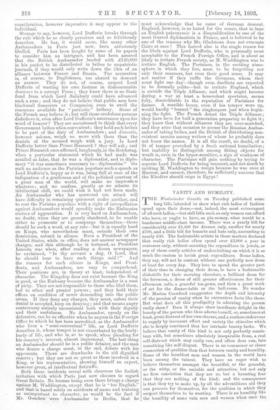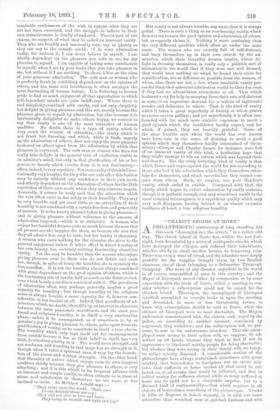VANITY AND HUMILITY.
THE Westminster Gazette on Tuesday published some long bills intended to show what rich ladies of fashion spend upon their dress,—not, indeed, the most extravagant of all such ladies,—but still bills such as only women can afford who have, or ought to have, as pin-money, what would be a handsome middle-class income. There was a yearly bill for considerably over £1,400 for dresses only, another for nearly £700, and a little bill for bonnets and hats only, amounting to nearly £40. The fashionable artists in these matters declared that really rich ladies often spend over £3,000 a year in costumes only, without counting the expenditure in jewels, or any of those costly articles of underclothing on which it is so much the custom to lavish great expenditure. Some ladies, they say, will not be content without one perfectly new dress at least for every day. They love to spend the greater part of their time in changing their dress, to have a fashionable deshabille for their morning chocolate, a brilliant dress for the forenoon, a dress of still greater effectiveness for their afternoon calls, a graceful tea-gown, and then a great work of art for the dinner-table or the ball-room. No wonder Mr. Marion Crawford exaggerates the depth and intensity of the passion of vanity when he encounters facts like these. But what does all this prodigality in adorning the person really show P Does it always show inordinate delight in the beauty of the person who thus adorns herself, or, sometimes at least, great distrust of her own charms, and a restless endeavour to supply by incessant effort and variety the stimulus which she is deeply convinced that her intrinsic beauty lacks. We believe that vanity of this kind is not only perfectly consis- tent with, but sometimes absolutely inseparable from, a real self-distrust which may easily run, and often does run, into something like self-disgust. There is no commoner or closer connection of qualities than that between vanity and humility. Some of the humblest men and. women in the world have been among the vainest. They have an eager wish to believe themselves amongst the beautiful, or the graceful, or the witty, or the amiable and attractive, but not only no firm conviction that they are so, but a haunting fear that they are nothing of the kind; and the consequence is that they try to make up, by all the adventitious aid they can procure for themselves, for the qualities in which they suspect themselves to be wanting. There is no humility like the humility of some vain men and women when once the
insatiable restlessness of the wish to appear what they are not has been exorcised, and the struggle to believe in their own attractiveness is finally abandoned. That is part of the charm, we suspect, of what may be called an innocent vanity. They who are frankly and innocently vain, say as plainly as they can say to the outside world : I do want admiration badly, for without it, I can never believe in myself. I am wholly dependent on the pleasure you take in me, for my pleasure in myself. I am capable of taking some satisfaction in myself, when I see by your looks that you take pleasure in me, but without it I am nothing. In short, I live on the alms of your generous admiration.' The vain man or woman who is perfectly frank in exhibiting dependence on the opinion of others, and has some real lovableness, is often amongst the most fascinating of human beings. It is flattering to human pride to find so much enjoyment of that approbation to which self-dependent minds are quite indifferent. Where there is real simplicity combined with vanity, and not only simplicity but delight in giving pleasure, and this not merely because the pleasure given is repaid by admiration, but also because it is intrinsically delightful to make others happy, we venture to say that vanity is one of the most attractive of human qualities. No doubt, there is a type of vanity which is very much the reverse of attractive,—the vanity which is not frank but fineasing, and which, while it feeds eagerly on the admiration of others, does not enjoy the mere pleasure bestowed on others apart from the admiration by which that pleasure is expressed. The vain man or woman who does not really take delight in the general tone of exaltation visible in an admirer's mind, but only in that glorification of his or her genius or beauty which results from it, is not fascinating,— often, indeed, is very repulsive. Yet even vanity of this kind is oc- casionally very humble, for they who are vain after this fashion may be entirely without any confidence in their own merit, and utterly dependent on the admiration of others for the little conviction of their own merit which they may contrive to gain. Assuredly, it cannot be truly said that the attraction which the vain often exert is due solely to their humility. They may be very humble, and yet exert little or no attraction if their humility is not combined with a certain freedom and generosity of manner. It is the hearty pleasure taken in giving pleasure,— and in giving pleasure without reference to the amount of admiration inspired,—which is so attractive. A woman who enjoys her beautiful dresses quite as much because she sees that all present are the happier for them, as because she sees that they all admire her, may be vain; but her vanity is charming. A woman who cares nothing for the stimulus she gives to the general enjoyment unless it takes effect in direct worship of her own beauty, has certainly nothing fascinating about her vanity. Yet she may be humbler than the woman who enjoys giving pleasure even to those who do not flatter and exalt her, though, in spite of being the humbler, she is certainly the less unselfish. It is not the humility almost always combined with great dependence on the good opinion of others, which is the fascinating side of vanity, half as much as the disinterested- ness which is only sometimes combined with it. The greediness of admiration often, nay, perhaps generally, implies a great capacity for humility ; but though humility in the religious sense is always lovable, a mere capacity for it, however con- siderable, is not lovable at all. Indeed, that greediness of ad- miration, 'which, no doubt, often fills up an interval in character between the most passionate worldliness and the most pro- found and religious humility, is in itself a very unattractive phase, unless it be accompanied, as it sometimes is, by so
genuine a joyin giving pleasure to others, quite apart from the gratification of vanity, as to constitute in itself a true charm. The humility which only lays itself out for encouragement from outside because it has so little belief in itself, has very little fascinating quality in it. The world loves strength, and not weakness, and humility in that stage has no strength in it, though when it takes a spiritual turn, it may lay the founda- tion of the truest and noblest strength. On the other hand, that liberality of nature which enjoys even its own happiest qualities chiefly because they give pleasure to others, is very attaching ; and it is this which, in its frequent alliance with an innocent and simple vanity, so often attracts us in those at
whose naïf aatisfaction in themselves we are more or less inclined to smile. As Matthew Arnold says :— "They shine upon the world. Their ears To one demand alone are coy ; They will not give us love and tears, They bring us warmth and light and joy." But vanity is not always humble, any more than it is always genial. There is such a thing as an overbearing vanity, which does not try to earn the good opinion and admiration of others, but arrogantly claims it. Nothing is more confusing than the very different qualities which often go under the same name. The women who are secretly full of self-distrust, and buoy themselves up in their own esteem by the ad- miration which their beautiful dresses inspire, whose de- light in dressing themselves is really only a pathetic sort of intimation to the world that if they were not well dressed, they would have nothing on which to found their claim for consideration, are as different as possible from the women, of whom, also, there are not a few, whose insatiable vanity per- suades them that universal admiration would be their due even if they had no adventitious attractions at all. That which is almost a cry for help in escaping from their own self-distrust in some, is an imperious demand for a tribute of legitimate wonder and deference in others. That is the kind of vanity which it takes a great superfluity of beauty or wit or genius to excuse or even palliate ; and yet superficially it is often con- founded with the much more amiable eagerness to merit a good opinion which the candidates hardly expect, and for which, if gained, they are heartily grateful. Some of the most humble men whom the world has ever known have been vain in the sense of desiring to merit a good opinion which they themselves hardly entertained of them- selves ;—Cowper and Charles Lamb, for instance, were full of an innocent vanity of this kind, a hesitating hope that they might manage to win an esteem which was beyond their real deserts. But the truly irritating kind of vanity is that which fumes and rages against the world for not according to those who feel it the admiration which they themselves enter- tain for themselves, and which nevertheless they cannot con- quer from others. Such, we suspect, was poor Hayden's vanity, which ended in suicide, Compared with that, the vanity which hopes to extort admiration by costly costume, though it is pathetic enough, and may sometimes result in the most criminal extravagance, is a superficial quality which may very well disappear, leaving behind it an almost excessive lowliness of heart, a true religious humility.



































 Previous page
Previous page